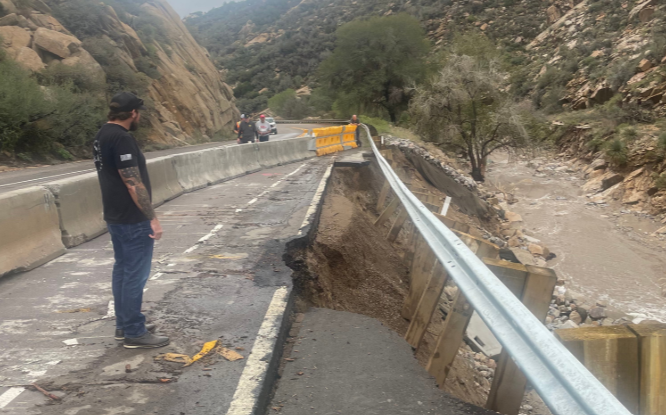
by Staff Reporter | Jan 23, 2026 | News
By Staff Reporter |
The man who set fire to a Tesla dealership last April received the minimum sentence possible.
Ian William Moses of Mesa, 35, received five years in prison and three years of supervised release in a sentence handed down last week.
Maricopa County Attorney Rachel Mitchell said the sentence conveyed nontolerance of political violence and intimidation.
“This sentence sends a clear message: violence and intimidation have no place in our community,” said Mitchell. “Setting fire to a business in retaliation for political or personal grievances is not protest — it is a crime. Our community deserves to feel safe, and this sentence underscores that Maricopa County will not tolerate political violence in any form.”
Similarly, U.S. Attorney Timothy Courchaine said the sentence was appropriate for Moses’ crimes.
“Arson can never be an acceptable part of American politics. Mr. Moses’ actions endangered the public and first responders and could have easily turned deadly,” said Courchaine. “This five-year sentence reflects the gravity of these crimes and makes clear that politically fueled attacks on Arizona’s communities and businesses will be met with full accountability.”
Early one morning last April, a disguised Moses biked to a Tesla dealership in Mesa. Moses used a gas can and fire starter logs to start the fires.
Moses caused one Cybertruck to explode in his attempt to burn down the dealership, and spray painted the word “thief” on a wall, misspelled as “THEIF.” All the while, surveillance cameras and cameras within the Tesla vehicles captured Moses carrying out his crime.
Mesa officers found Moses about an hour after he committed arson, around a quarter of a mile away from the dealership. Moses was wearing the same clothes and riding the same bike. Police found a hand-drawn map of his target, with a “T” to mark the location of the Tesla dealership.
The Department of Justice sought to prosecute Moses to “the fullest extent of the law” on domestic terrorism charges.
“If you engage in domestic terrorism, this Department of Justice will find you, follow the facts, and prosecute you to the fullest extent of the law,” said Attorney General Pamela Bondi. “No negotiating.”
Moses faced five counts of malicious damage to property or vehicle in interstate commerce by means of fire. Each count carried the possibility of five years minimum up to 20 years maximum in prison. He pleaded guilty to all five charges.
It appears the court was persuaded by Moses placing the blame on his recent autism diagnosis.
A defense sentencing memorandum filed earlier this month blamed Moses’ high-functioning autism for his decision to commit arson. The defense revealed he had recently received an autism diagnosis leading up to the crime and had been receiving therapy every other week.
The memorandum described Moses as a “kind, gentle, helpful, compassionate, and deeply caring person who would never deliberately hurt anyone.”
Three months before Moses committed his arson in January 2025, anti-Trump activists began targeting Tesla vehicles with arson, gunfire, and vandalism. The attacks were motivated by Tesla CEO Elon Musk’s senior advisership of President Donald Trump and his appointment to lead the Department of Government Efficiency (DOGE). Musk left DOGE in May.
In March, a month before Moses carried out his attack, the FBI issued a public service announcement advising of these politically motivated targeted attacks.
AZ Free News is your #1 source for Arizona news and politics. You can send us news tips using this link.

by Ethan Faverino | Jan 23, 2026 | Economy, News
By Ethan Faverino |
Arizona State Representative Leo Biasiucci (R-LD30) has introduced House Bill 2839, bipartisan legislation that would prohibit cities and towns across Arizona from imposing transaction privilege taxes or similar local taxes on food items that are eligible for purchase with benefits from the Supplemental Nutrition Assistance Program (SNAP) and the Special Nutrition Program for Women, Infants, and Children (WIC).
“In her State of the State address, Governor Hobbs said she wants to lower taxes for hardworking Arizona families,” stated Rep. Biasiucci. “I’m taking her at her word and answering that call by introducing HB 2839. This bill removes local taxes from the one thing every family needs to survive—food.”
HB 2839 amends ARS Section 42-6015 to clarify that municipalities may not levy transaction privilege, sales, use, franchise, or other similar taxes on SNAP and WIC-eligible food items, regardless of whether the purchaser participates in those programs.
These federal programs cover basic, essential foods such as fruits, vegetables, meats, dairy, breads, and other necessities for “home consumption.” Taxing these items increases costs for families already facing tight budgets, and the bill aims to provide tax relief by extending the exemption uniformly.
“Taxing SNAP and WIC food purchases is wrong. These are necessities, not luxuries,” added Biasiucci. “If the Governor is serious about lowering taxes, this bill should be an easy yes. If she vetoes it, that will speak volumes. Arizonans will know exactly where she really stands when she talks about tax relief for families.”
The legislation would apply retroactively to taxable periods beginning on or after the first day of the month following the general effective date, ensuring swift relief if enacted. Supporters highlight that approximately 70 Arizona municipalities currently impose some form of tax on food, and this measure could help families save hundreds of dollars annually on groceries.
Representative Biasiucci is joined by a bipartisan group of co-sponsors, including four Democratic representatives, fifteen Republican representatives, and one Democratic senator.
Ethan Faverino is a reporter for AZ Free News. You can send him news tips using this link.

by Matthew Holloway | Jan 23, 2026 | News
By Matthew Holloway |
Three bills addressing radiation exposure risks for health care workers moved out of the Senate Health & Human Services Committee on unanimous votes Wednesday, advancing a legislative package sponsored by Sen. Carine Werner (R-LD4) focused on updating safety standards in high-radiation medical settings.
According to the Senate, the legislation would make Arizona the first state to mandate these protections by statute.
The bipartisan legislative package targets exposure risks associated with real-time X-ray imaging used in cardiac catheterization labs and other advanced procedure rooms.
The three bills that passed out of the Senate Health & Human Services Committee are:
- SB 1120, which would require hospitals that perform real-time X-ray procedures to install modern radiation protection systems in at least half of their procedure rooms by July 2027. These systems are designed to shield staff more effectively than traditional lead aprons and to track exposure levels in real time.
- SB 1121, which addresses the use of protective equipment and exposure monitoring during procedures. The bill specifies standards for radiation protection systems and would clarify how they replace or augment traditional protective gear such as lead aprons.
- SB 1118, which would create a grant program to assist rural hospitals and health care facilities with the costs associated with installing radiation protection systems. It is designed to mitigate geographic and budgetary barriers to compliance.
Werner has highlighted radiation exposure as an occupational hazard for doctors, nurses, and radiographers who perform imaging-intensive procedures. Supporters of the legislation argue that updated shielding technology and exposure tracking could reduce long-term health risks for medical personnel.
In a statement, Werner said, “These are the people saving our lives every day, and too often they’re doing it at the cost of their own long-term health. We know the risk. We have the technology to reduce it. Now we’re taking action.”
“This is about protecting the people behind the scenes. The nurses. The techs. The doctors who don’t make headlines but make care possible,” Werner continued. “If these bills are signed into law, Arizona will lead the nation in recognizing that health care workers deserve the same protections as the patients they serve.”
The radiation protection systems referenced in the legislation are defined as shielding that offers protection at least equivalent to or better than a .25 millimeter lead-equivalent apron, according to the bill’s summary.
All three measures now head to the full Senate for consideration.
Matthew Holloway is a senior reporter for AZ Free News. Follow him on X for his latest stories, or email tips to Matthew@azfreenews.com.

by Staff Reporter | Jan 22, 2026 | News
By Staff Reporter |
Voters may soon get to decide whether or not photo radar will continue to be used in the state.
A committee in the State Senate approved the bill on Tuesday.
SCR 1004 would ban photo enforcement systems used to identify violators of speed restrictions or traffic control devices from the entire state.
If approved by the state legislature, the measure could appear on the ballot as early as this November. Lawmakers opted for a resolution as a more viable pathway to bypass the requirement for Governor Katie Hobbs’ approval.
The governor didn’t support attempts to ban photo radar in the past.
Last year, the governor vetoed the same legislative language (outlined in a bill rather than a resolution) after its party-line approval in the legislature. No Democrats in either the House or Senate voted for the bill. Hobbs’ veto letter argued that the removal of photo radar would make the roads more dangerous, not safer.
“This bill attempts to remove the ability of local law enforcement to keep our streets safe by eliminating a tool used to enhance roadway safety,” stated Hobbs.
This sentiment was shared by Democratic lawmakers. State Sen. Lauren Kuby argued that certain studies supported the effectiveness of photo enforcement systems to reduce and deter traffic violations.
During voting on the bill last year, some Republicans — Reps. Teresa Martinez, Justin Wilmeth, Alexander Kolodin — did express doubts about the strategy of advancing a bill with SB 1019 rather than a resolution. An identical measure existed in SCR 1002.
Wilmeth said they were “wasting” their time by voting on the bill version of the legislation rather than the resolution.
“I want my Republican caucus members to understand: this bill will pass, and it will get vetoed,” said Wilmeth. “This is what majorities are about, and in this issue we are wasting our opportunity.”
Kolodin said Democrats were defending photo radar under false pretenses of public safety concerns, and that their true intentions had to do with ticket revenues’ ties to clean election campaign funds.
“The photo radar scam is the way that our friends across the aisle fund their war machine. They run candidates in noncompetitive districts and funnel taxpayer money over to competitive districts, all on the backs of hardworking Arizona drivers who are denied due process when they receive their traffic tickets,” said Kolodin. “It’s almost as if we’re more interested in making a show of solving the problem than actually solving the problem.”
State Sen. Wendy Rogers authored both pieces of legislation last year and was the lawmaker to reintroduce it again this year.
Rogers disputed Hobbs’ veto claim in a press release published on Tuesday. The state senator stressed the unreliability of automated enforcement, which is what photo radars operate under. Rogers said it should be law enforcement, not technology, to make the judgment call on violations of traffic law.
“Automated enforcement removes discretion, undermines due process, and turns routine driving into a revenue stream,” said Senator Rogers. “That’s not how law enforcement should work in Arizona. The resolution does not excuse dangerous driving or eliminate traffic enforcement. It ensures that enforcement decisions are made by trained law enforcement officers, not algorithms and contractors.”
AZ Free News is your #1 source for Arizona news and politics. You can send us news tips using this link.

by Matthew Holloway | Jan 22, 2026 | News
By Matthew Holloway |
Arizona State Rep. Walt Blackman (R-LD7) has introduced a constitutional measure to change legislative term lengths, adjust term limits, and establish new post-service lobbying restrictions for former legislators.
Blackman, who serves as chairman of the House Government Committee, filed House Concurrent Resolution 2014 (HCR 2014), which would refer the proposed changes to voters in a statewide election.
The measure is broad and would double the current two-year terms of the House and Senate and impose limitations on their ability to lobby upon leaving office.
“Legislators work for the voters, not for themselves or for future lobbying clients,” Blackman said in the release. “HCR 2014 sets clear limits on how long lawmakers can stay in office and draws a hard line after they leave. It strengthens accountability and keeps the focus where it belongs — on the people we’re elected to serve.”
Under the measure:
- Legislative terms would transition to four-year terms beginning in 2033.
- Legislators would be limited to eight years of consecutive service in each chamber.
- Representatives and senators could only return to the same chamber after a one-term break.
- Former legislators would be subject to a one-year “cooling-off” period before they may lobby the Legislature, though they could still engage in other professional or civic activity during that time.
As a constitutional resolution, HCR 2014 must be approved by Arizona voters in a statewide election to take effect.
As the legislative session progresses, the Resolution is likely to spark debate in both chambers of the Legislature and among Arizona voters over the nature of representation, accountability, and the relationship between elected officials and special interests.
Matthew Holloway is a senior reporter for AZ Free News. Follow him on X for his latest stories, or email tips to Matthew@azfreenews.com.

by Matthew Holloway | Jan 22, 2026 | News
By Matthew Holloway |
In the aftermath of historic flooding across Gila County in September 2025, Arizona communities are still wrestling with the long road toward recovery, and the federal government’s initial refusal to provide disaster relief has only added to the frustration.
On Thursday, U.S. Rep. Eli Crane (R-AZ02) took action, sending a letter to President Donald Trump and FEMA Region IX Administrator Robert Fenton uring them to intervene in Arizona’s appeal of FEMA’s denial of a Major Disaster Declaration. He was joined by Reps. Andy Biggs (R-AZ05), Juan Ciscomani (R-AZ06), and David Schweikert (R-AZ01).
The disaster declaration, would unlock vital federal funds and resources under the Robert T. Stafford Disaster Relief and Emergency Assistance Act to help communities like Globe, Miami, and other rural areas rebuild infrastructure, support residents, and mitigate future flood risks.
The appeal follows FEMA’s December 20, 2025, denial, a decision that came despite the state and local officials’ reassessment estimating damages well above $100 million.
“The new figures reflect substantial and unanticipated financial burdens placed on local jurisdictions, which were required to undertake immediate emergency protective measures, restore essential services, and address damage to roads, utilities, and public facilities,” Crane wrote in the letter.
He added, “When viewed in the aggregate, these impacts demonstrate a level of strain that exceeds the reasonable capacity of affected communities to manage without federal support.” Crane has engaged directly with FEMA officials in Washington, D.C., and invited them to visit Gila County to see conditions firsthand.
“With this more accurate assessment,” Crane said, “FEMA will now have a better sense of the damage to these storied communities. While many democrat elected officials were quick to point fingers and score cheap points, we worked behind the scenes to strengthen our efforts and believe the State of Arizona’s updated figures present a far stronger case for federal assistance. We applaud President Trump’s ongoing commitment to Arizona and look forward to continuing our work with his team at FEMA as they consider this appeal, which would deliver much-needed assistance to residents in rural Arizona.”
The original denial has drawn bipartisan criticism, including from Democrat Gov. Katie Hobbs, who argued the decision left families and local governments to shoulder rebuilding without critical federal support.
As federal officials weigh the appeal, residents and local leaders in Gila County continue working to recover from floods that overwhelmed watersheds, washed out infrastructure, and left lasting damage to homes and businesses.
Matthew Holloway is a senior reporter for AZ Free News. Follow him on X for his latest stories, or email tips to Matthew@azfreenews.com.






